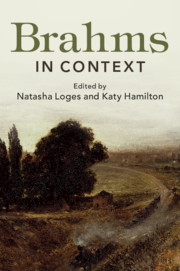Book contents
- Brahms in Context
- Brahms in Context
- Copyright page
- Dedication
- Contents
- Illustrations
- Music Examples
- Notes on Contributors
- Preface
- Abbreviations
- Part I Personality, People and Places
- Chapter 1 Childhood in Hamburg
- Chapter 2 The Schumanns
- Chapter 3 Vienna
- Chapter 4 Leipzig and Berlin
- Chapter 5 Personal Habits
- Chapter 6 Correspondence
- Chapter 7 Holidays
- Part II Identities, Environments and Influences
- Part III Performance and Publishing
- Part IV Society and Culture
- Part V Reception and Legacy
- Further Reading
- Index
- References
Chapter 4 - Leipzig and Berlin
from Part I - Personality, People and Places
Published online by Cambridge University Press: 15 May 2019
- Brahms in Context
- Brahms in Context
- Copyright page
- Dedication
- Contents
- Illustrations
- Music Examples
- Notes on Contributors
- Preface
- Abbreviations
- Part I Personality, People and Places
- Chapter 1 Childhood in Hamburg
- Chapter 2 The Schumanns
- Chapter 3 Vienna
- Chapter 4 Leipzig and Berlin
- Chapter 5 Personal Habits
- Chapter 6 Correspondence
- Chapter 7 Holidays
- Part II Identities, Environments and Influences
- Part III Performance and Publishing
- Part IV Society and Culture
- Part V Reception and Legacy
- Further Reading
- Index
- References
Summary
Robert Schumann’s 1853 essay ‘New Paths’ is famous for its prophetic introduction of the young Johannes Brahms to the wider German musical community. In this, his last piece of published criticism, Schumann presented Brahms, then a virtually unknown young composer, as a Messiah-like figure for a nascent musical era, one who would be called to ‘give the highest expression to the times in an ideal manner’ The final sentence of Schumann’s essay has often been overlooked, but it is significant for the glimpse that it offers of the place that he envisioned for Brahms in the future: ‘In every era there presides a secret league of kindred spirits. Draw the circle tighter, you who belong together, that the truth of art may shine ever more clearly, spreading joy and blessings everywhere!’ [see Ch. 31 ‘Germany’].
- Type
- Chapter
- Information
- Brahms in Context , pp. 33 - 43Publisher: Cambridge University PressPrint publication year: 2019



